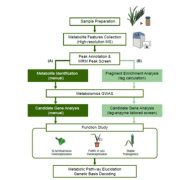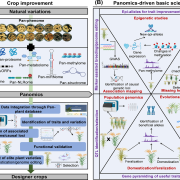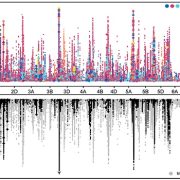A novel metabolite confers salt tolerance to Arabidopsis from Cape Verde Islands
 Rising sea levels and increasing salt accumulation in irrigated soils are threatening food production globally. There is a lot to be learned from plants that have evolved tolerance to salt. In this new preprint, Martínez-Rivas et al. explored the mechanism of salt tolerance the Cvi-0 accession of Arabidopsis that is sourced from the Cape Verde Islands, an island country off the west coast of Africa with very saline soils. Through combined metabolomics and QTL approaches they identified a disaccharide metabolite, which they call U2746, strongly associated with the Cvi-0 allele; this allele also negatively affects levels of glucuronic acid. The causal gene encodes a glycoside hydrolase family 38 protein (GH38cv) previously shown to affect salt tolerance. The authors showed that GH38cv directly controls the accumulation of U2746 and glucuronic acid, with the Cvi-0 allele carrying mutations that affect its function leading to accumulation of U3746. Interestingly, they identified different mutations in this gene in Arabidopsis plants isolated from the Cape Verde islands, suggesting positive selection for the presence of this disaccharide in these harsh environments. The authors haven’t yet identified what role this novel disaccharide has in salt tolerance (possibly as a signal, osmolyte, or wall modifier), but speculate that it could provide opportunities for agriculture, either through exogenous production or gene editing approaches. (Summary by Mary Williams @PlantTeaching) bioRxiv https://www.biorxiv.org/content/10.1101/2024.05.21.595092v1
Rising sea levels and increasing salt accumulation in irrigated soils are threatening food production globally. There is a lot to be learned from plants that have evolved tolerance to salt. In this new preprint, Martínez-Rivas et al. explored the mechanism of salt tolerance the Cvi-0 accession of Arabidopsis that is sourced from the Cape Verde Islands, an island country off the west coast of Africa with very saline soils. Through combined metabolomics and QTL approaches they identified a disaccharide metabolite, which they call U2746, strongly associated with the Cvi-0 allele; this allele also negatively affects levels of glucuronic acid. The causal gene encodes a glycoside hydrolase family 38 protein (GH38cv) previously shown to affect salt tolerance. The authors showed that GH38cv directly controls the accumulation of U2746 and glucuronic acid, with the Cvi-0 allele carrying mutations that affect its function leading to accumulation of U3746. Interestingly, they identified different mutations in this gene in Arabidopsis plants isolated from the Cape Verde islands, suggesting positive selection for the presence of this disaccharide in these harsh environments. The authors haven’t yet identified what role this novel disaccharide has in salt tolerance (possibly as a signal, osmolyte, or wall modifier), but speculate that it could provide opportunities for agriculture, either through exogenous production or gene editing approaches. (Summary by Mary Williams @PlantTeaching) bioRxiv https://www.biorxiv.org/content/10.1101/2024.05.21.595092v1









